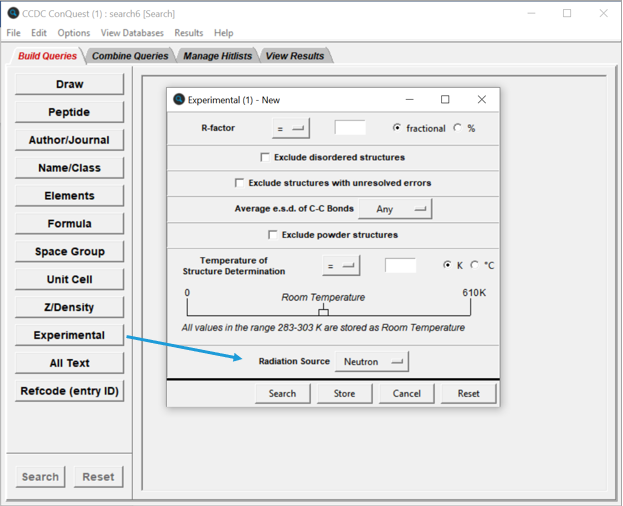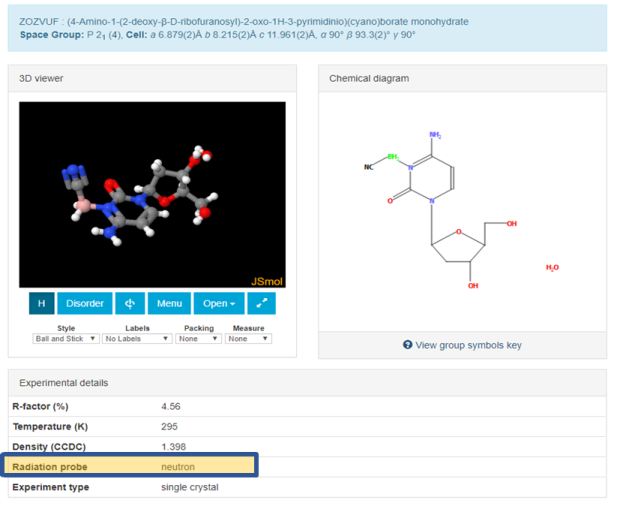FAQs
Neutron Diffraction Data in the CSD
Solution
Neutron diffraction data is included in the CSD and this FAQ details how to find and deposit neutron diffraction data. For more information about what data can be deposited into the CSD see our Deposit A Structure page.
As part of a CSD Improvement Project, we are working to ensure structures measured at neutron sources are labelled consistently and can be searched for using CCDC tools. CSD entries identified as being measured with neutron radiation should be flagged with the phrase ‘neutron’. This information is added to the entry upon Data Curation by one of our CSD Editors. Our software checks information in certain CIF fields to automatically identify neutron studies, or this information can be added manually (if editor identifies a neutron structure during curation).
We are working to improve our tools to automatically identify and label such structures by recognising them from the information provided to us upon deposition of the structure to the CSD.
How to find neutron structures:

Neutron diffraction studies can be found using CCDC ConQuest. Select the ‘Experimental’ button in the ‘Build Queries’ tab and then select ‘Neutron’ in the ‘Radiation Source’ option box which appears. This should return a list of results where the radiation source has been assigned as ‘Neutron’.
There may be more information about the refinement process in the CCDC Notes section, found in the ‘Experimental’ Tab. This information is also displayed in our WebCSD system in the ‘Radiation Probe’ field.

Image of Refcode ZOZVUF showing how neutron diffraction structures are displayed in WebCSD
How to deposit:
To ensure your structure is identified correctly as being measured with neutron diffraction we encourage you to identify this within your CIF file, by including ‘Neutron’ in the following CIF fields:
_diffrn_radiation_probe ‘Neutron’
_diffrn_radiation_type ‘Neutron’
We also suggest including information about the data collection in the following CIF fields:
| CIF field | Information to include |
| _diffrn_source | The general neutron source used in experiment |
| _diffrn_source_type | Specific information about the neutron source used, such as the facility and beamline name |
| _diffrn_measurement_device | The general name of the goniometer used |
| _diffrn_measurement_device_type | Specific make/model of the goniometer used |
| _diffrn_detector | The general name of the detector used |
| _diffrn_detector_type | Specific make/model of the detector used |
| _exptl_special_details | Any additional special details about the experimental setup |
| _diffrn_special_details | Any additional special details about the diffraction data collection |
The CCDC recommends including the name of the facility and beamline used for the experiment as we recognise the value of being able to trace data collected for facilities. More information on our work identifying the facility and beamline from CIFs can be found on this poster and within this blog post about data completeness.
The full definition of what should be included in all of these fields can be found in the IUCr’s coreCIF dictionary.
The CCDC has a list of guidelines of the information we would recommend be present in a CIF, which can be found here.
What next?
We are currently working to evolve our underlying database and associated systems and so we hope to be able to enhance our deposition processes and provide more options for you to recognise this type of structures and filter on these structures in the future.
Important information:
This is an ongoing improvement project at CCDC. As such, until Version 5.42 of the database is released (estimated November 2020), a small proportion of the neutron studies in the CSD may be incorrectly labelled.